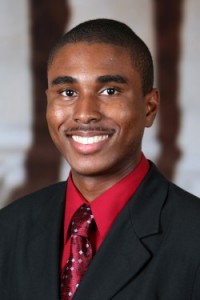 Xavier J. Monroe, a 2013 UF graduate, belongs on a UFTeach student recruitment poster.
Xavier J. Monroe, a 2013 UF graduate, belongs on a UFTeach student recruitment poster.
And that’s even before he was awarded a prestigious Graduate Research Fellowship in STEM education and learning research recently from the National Science Foundation.
While Monroe was still a UF undergraduate double-majoring in civil engineering and history, and also minoring in African Studies, the College of Education in 2011 enrolled him in yet another degree program–its new UFTeach mathematics education minor.
For someone with Monroe’s drive, what’s one more degree program, right?
The UFTeach minor degree programs in math or science education together are one of the pillars of the college’s STEM education reform strategy. The goal of UFTeach is to enlist top science, technology, engineering and math majors and prepare them to teach effectively in one of those vital STEM disciplines at the middle or high school grade levels.
Monroe personifies what UFTeach is all about. After simultaneously earning all four UF degrees—the two majors and both minors, the east Gainesville native and former Florida Academic Scholar went on to obtain his master’s in educational leadership and policy a year later from the University of Michigan.
He’s now poised to start his second year of Ph.D. studies in educational policy at Stanford University, coinciding with his selection as an NSF Graduate Research Fellow.
After Monroe completes his doctorate, he said he’d like to become a college professor and conduct education research in areas such as school transformation, policies and practices that will improve student achievement, the role of family and community partnerships with public schools, and issues of equity and access in STEM education, particular for underrepresented minorities.
Monroe said he’s grateful for the impact that UFTeach has had on his education philosophy and career path.

Monroe poses with a group of kids he met in Kano, Nigeria, where he conducted research as a UF undergraduate.
“The level of training and guidance from UFTeach equipped me with tools to succeed in the classroom as a pre-service teacher and in my local community work as an after-school instructor,” Monroe said. “This was also the beginning of my transition to the education field.”
“Education requires a great sense of humility, passion and the ability to partner with families and communities to best meet the needs of students, particularly our most vulnerable students,” he added.
Monroe said he vividly remembers something that UF STEM education instructor Kent Crippen said one night in class: “Students do not need your sympathy, they need you to teach them in ways that help to address the issues they face.”
Monroe’s fellowship was one of only 16 awarded by NSF in STEM education and learning research. The fellowship will support his study of the influence of teachers relating teaching content to the cultural backgrounds of their students.
Associate professor Crippen said Xavier’s fellowship award “is a significant accomplishment for a UFTeach alumnus and demonstrates the scope and broader impact of the program.”
CONTACTS
SOURCE: Xavier Monroe, monroexj@stanford.edu
SOURCE: Kent Crippen, UF College of Education; 352-273-4222; kcrippen@coe.ufl.edu
WRITER: Larry Lansford, communications director, UF College of Education; 352-273-4137; llansford@coe.ufl.edu;